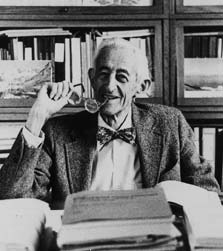 ABEL WOLMAN, A&S 1913, Engr 1915, one of Hopkins’ first engineering graduates, became a world-renowned water treatment expert whose career in civil engineering spanned more than 70 years. From 1914 to 1939 he was an engineer for the Maryland Health Department, for several years serving as chief engineer. He joined the Hopkins faculty in 1920 and, beginning in 1937, served full time in both the schools of Engineering and of Public Health. Dr. Wolman retired from teaching in 1962, but continued to work full time for more than 20 years, consulting with engineers and health organizations worldwide. Although he was the major architect of Baltimore’s water system, Dr. Wolman’s greatest interest was the environmental well-being of people in developing nations. By his late 80s, he had been to Geneva for the World Health Organization 40 times, had helped build water treatment systems in 40 countries, and had authored four books and hundreds of articles.
ABEL WOLMAN, A&S 1913, Engr 1915, one of Hopkins’ first engineering graduates, became a world-renowned water treatment expert whose career in civil engineering spanned more than 70 years. From 1914 to 1939 he was an engineer for the Maryland Health Department, for several years serving as chief engineer. He joined the Hopkins faculty in 1920 and, beginning in 1937, served full time in both the schools of Engineering and of Public Health. Dr. Wolman retired from teaching in 1962, but continued to work full time for more than 20 years, consulting with engineers and health organizations worldwide. Although he was the major architect of Baltimore’s water system, Dr. Wolman’s greatest interest was the environmental well-being of people in developing nations. By his late 80s, he had been to Geneva for the World Health Organization 40 times, had helped build water treatment systems in 40 countries, and had authored four books and hundreds of articles.
A member of the National Academies of Engineering and Science, Dr. Wolman was honored in 1960 with the Lasker Award for his “engineering skill and organizational genius,” which had done so much to improve the health of millions. In 1969, the university awarded him an honorary degree. Dr. Wolman, who died in 1989 at the age of 96, was named Marylander of the Century by the Baltimore Sun in 1999.